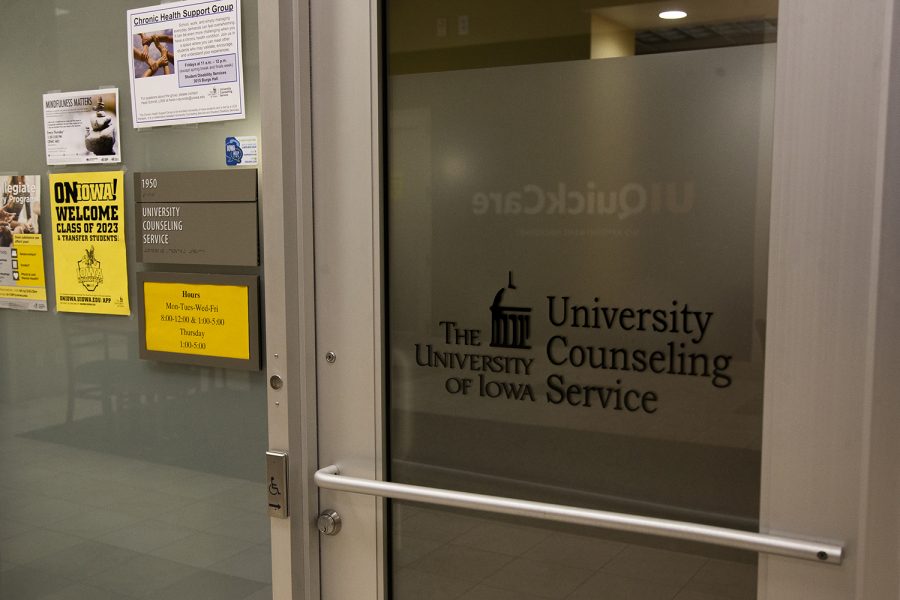UI offers tele-mental health resources with campus closed to contain coronavirus spread
The changes to everyday life that have been implemented in an attempt to prevent the spread of COVID-19 are raising questions about how the pandemic may affect the mental health of students.
The University Counseling Services office is seen in the Old Capital Mall on Monday, February 17, 2020.
March 26, 2020
Concerns about the COVID-19 pandemic’s effect on student mental health are rising with campus largely shut down and Hawkeyes separated from their university support systems, but University Counseling Services offers tele-mental health options to help students cope from a distance.
University Counseling Services Director Barry Schreier said a key factor of COVID-19’s impact on student mental health is that it is not one-size-fits-all — it is something that will affect students differently depending on who they are.
“You might think of a student who could easily and readily go home because they live just an hour away versus a student who is from a country that they cannot get back to now,” Schreier said. “In terms of the impact of social isolation, it depends on the support network a student has around them and the ready availability they have to others.”
The UI announced March 18 that classes would move online after spring break for the remainder of the semester, closed residence halls, and canceled spring commencement and all nonessential events to contain the spread of COVID-19.
RELATED: Study shows nationwide increase in mental-health treatment among college students
Because these community mitigation efforts interrupted the semester so unexpectedly, many students were left to go home — uncertain when they would see friends for an extended period of time.
“College is a time to make all of those friends and connections, but now we are just stuck at home,” said Sydney Row, a transfer student from Marengo, Illinois. “It’s a sense of loneliness, not as much right now, but I feel like as the summer goes on, we are going to wish we would have had more time to do more things.”
Following Iowa Gov. Kim Reynolds announcement of a public-health disaster emergency on March 17 — which mandated the closure of most shops, restaurants, and exercise facilities in the state — Schreier emphasized the importance of students sticking to a normal routine as much as possible.
“Happiness should not necessarily be an expectation for us because this is a stressful and unpredictable time, but we tell students to be accepting of themselves for whatever emotional reaction they are having,” Schreier said. “It gets too easy to let typical daily schedules go and then time gets weird, and it begins to get especially stressful for folks.”
According to the UCS website, UCS will provide services remotely until further notice. UCS will continue therapy appointments for both new and returning clients via tele-mental health.
For students wanting to seek services in their own communities, the website gives recommendations for how to find a local therapist and how to find out what certain insurance plans will cover.
UCS will also offer a virtual group support meeting via Zoom for any student seeking support for coping with the COVID-19 pandemic, and it is first come, first served for up to 12 participants. The group will run from 1-2 p.m. each Wednesday and is drop-in, so students may attend once or as many times as they wish.
RELATED: Study shows nationwide increase in mental-health treatment among college students
Many UI students have agreed that there is a need to stay as close to routine as possible in this stressful time. Jack Sieleman, a second-year mechanical engineering major from California, said he is just trying to do whatever he can to stay busy.
“I’ve been working ahead to get classwork started before classes start, walking my dog, learning how to play the guitar, doing what I can to have fun,” Sieleman said. “Working out is a major stress reliever for students, so it is important to get out and go for runs or do pushups and pull-ups where you can because even though gyms are closed that doesn’t mean you can’t exercise.”
Schreier added that it is important students do not get too caught up in the news about the virus and its spread.
“It can be alarming and anxiety-provoking and stressful, so we are telling folks to try to limit it to one hour per day,” Schreier said.
Schreier said students are still able to reach out to UCS if they feel they need help. Fewer students have used UCS resources recently because of spring break, he said, but more students than usual are expected to use those resources over the course of the semester.
“Students that we have seen already are responding well to [the online format],” Schreier said. “The research is good and it says that tele-mental health works, so we do think that it is effective and that it will continue to be effective.”



